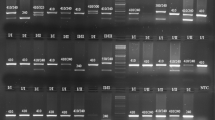Abstract
Interleukin-8 is a strong mediator of inflammation and has been implicated in the biochemical pathways involved in a wide range of inflammatory diseases including atherosclerosis. We investigated the potential influence of two common functional polymorphisms of the interleukin (IL)-8 gene: −251A/T and 781C/T on susceptibility to in stent restenosis (ISR) following percutaneous coronary intervention (PCI). The hypothesis was tested by screening for the prevalence of the above polymorphisms in 201 coronary artery disease (CAD) patients subjected to PCI and presenting with symptoms or signs of recurrent ischemia. Patients were angiographically re-evaluated and formed the ISR group (n = 73) and the non-ISR group (n = 128) based on the presence or absence of ISR. One hundred and forty-seven subjects without angiographic evidence of CAD formed a reference control group (non-CAD group). A borderline statistically significant higher frequency of the TT251TT781 combined genotype was observed in patients with ISR on re-evaluation compared with patients with normal follow-up angiography. The predominance of TT251TT781 was independent of conventional risk factors for cardiovascular disease. Consequently, T251T781 haplotype was significantly more common in the ISR group. The above observations indicate that the genetic diversity of the IL-8 gene influences patient susceptibility to ISR and suggests the implication of IL-8-mediated pathways in the process of ISR. However, the rarity of T251T781 haplotype makes any clinical application of the above observations unfeasible.

Similar content being viewed by others
References
Ross R (1999) Atherosclerosis—an inflammatory disease. N Engl J Med 340:115–126. doi:10.1056/NEJM199901143400207
Luster AD (1998) Chemokines—chemotactic cytokines that mediate inflammation. N Engl J Med 338:436–445. doi:10.1056/NEJM199802123380706
Boisvert WA, Curtiss LK, Terkeltaub RA (2000) Interleukin-8 and its receptor CXCR2 in atherosclerosis. Immunol Res 21:129–137. doi:10.1385/IR:21:2-3:129
Apostolakis S, Papadakis EG, Krambovitis E, Spandidos DA (2006) Chemokines in vascular pathology. Int J Mol Med 17:691–701
Hacking D, Knight JC, Rockett K et al (2004) Increased in vivo transcription of an IL-8 haplotype associated with respiratory syncytial virus disease susceptibility. Genes Immun 5:274–282. doi:10.1038/sj.gene.6364067
Ohyauchi M, Imatani A, Yonechi M et al (2005) The polymorphism interleukin 8–251 A/T influences the susceptibility of Helicobacter pylori related gastric diseases in the Japanese population. Gut 54:330–335. doi:10.1136/gut.2003.033050
Kamali-Sarvestani E, Aliparasti MR, Atefi S (2007) Association of interleukin-8 (IL-8 or CXCL8) −251T/A and CXCR2 +1208C/T gene polymorphisms with breast cancer. Neoplasma 54:484–489
Ben Nasr H, Chahed K, Mestiri S, Bouaouina N, Snoussi K, Chouchane L (2007) Association of IL-8 (−251)T/A polymorphism with susceptibility to and aggressiveness of nasopharyngeal carcinoma. Hum Immunol 68:761–769. doi:10.1016/j.humimm.2007.06.006
Wei YS, Lan Y, Tang RG et al (2007) Single nucleotide polymorphism and haplotype association of the interleukin-8 gene with nasopharyngeal carcinoma. Clin Immunol 125:309–317. doi:10.1016/j.clim.2007.07.010
McCarron SL, Edwards S, Evans PR et al (2002) Influence of cytokine gene polymorphisms on the development of prostate cancer. Cancer Res 62:3369–3372
Vogiatzi K, Apostolakis S, Voudris V, Thomopoulou S, Kochiadakis GE, Spandidos DA (2008) Interleukin 8 and susceptibility to coronary artery disease: a population genetics perspective. J Clin Immunol 28:329–335. doi:10.1007/s10875-008-9194-3
Gaunt TR, Rodríguez S, Day IN (2007) Cubic exact solutions for the estimation of pairwise haplotype frequencies: implications for linkage disequilibrium analyses and a web tool ‘CubeX’. BMC Bioinform 8:428. doi:10.1186/1471-2105-8-428
Hoffmann R, Mintz GS (2000) Coronary in-stent restenosis-predictors, treatment and prevention. Eur Heart J 21:1739–1749. doi:10.1053/euhj.2000.2153
Mitra AK, Agrawal DK (2006) In stent restenosis: bane of the stent era. J Clin Pathol 59:232–239. doi:10.1136/jcp.2005.025742
Third Joint Task Force of European, other Societies on Cardiovascular Disease Prevention in Clinical Practice (2003) European guidelines on cardiovascular disease prevention in clinical practice. Eur J Cardiovasc Prev Rehabil 10:1–78
Petrovic D, Peterlin B (2005) Genetic markers of restenosis after coronary angioplasty and after stent implantation. Med Sci Monit 11:RA127–RA135
Kastrati A, Koch W, Berger PB et al (2000) Protective role against restenosis from an interleukin-1 receptor antagonist gene polymorphism in patients treated with coronary stenting. J Am Coll Cardiol 36:2168–2173. doi:10.1016/S0735-1097(00)01014-7
Humphries S, Bauters C, Meirhaeghe A, Luong L, Bertrand M, Amouyel P (2002) The 5A6A polymorphism in the promoter of the stromelysin-1 (MMP3) gene as a risk factor for restenosis. Eur Heart J 23:721–725. doi:10.1053/euhj.2001.2895
Ferrero V, Ribichini F, Matullo G et al (2003) Estrogen receptor-alpha polymorphisms and angiographic outcome after coronary artery stenting. Arterioscler Thromb Vasc Biol 23:2223–2228. doi:10.1161/01.ATV.0000101181.81022.BF
Shah SH, Hauser ER, Crosslin D et al (2008) ALOX5AP variants are associated with in-stent restenosis after percutaneous coronary intervention. Atherosclerosis (Epub ahead of print)
Oguri M, Kato K, Hibino T et al (2007) Identification of a polymorphism of UCP3 associated with recurrent in-stent restenosis of coronary arteries. Int J Mol Med 20:533–538
Miranda-Malpica E, Martínez-Rios MA, Fragoso JM et al (2008) The interleukin 1B-511 polymorphism is associated with the risk of developing restenosis after coronary stenting in Mexican patients. Hum Immunol 69:116–121. doi:10.1016/j.humimm.2007.12.003
Caixeta AM, Brito FS Jr, Costa MA, Serrano CV Jr, Petriz JL, Da Luz PL (2007) Enhanced inflammatory response to coronary stenting marks the development of clinically relevant restenosis. Catheter Cardiovasc Interv 69:500–507. doi:10.1002/ccd.21007
Qi X, Li S, Li J (2003) The prognostic value of IL-8 for cardiac events and restenosis in patients with coronary heart diseases after percutaneous coronary intervention. Jpn Heart J 44:623–632. doi:10.1536/jhj.44.623
Gogo PB Jr, Schneider DJ, Watkins MW, Terrien EF, Sobel BE, Dauerman HL (2005) Systemic inflammation after drug-eluting stent placement. J Thromb Thrombolysis 19:87–92. doi:10.1007/s11239-005-1378-6
Author information
Authors and Affiliations
Corresponding author
Rights and permissions
About this article
Cite this article
Vogiatzi, K., Apostolakis, S., Voudris, V. et al. Interleukin 8 gene polymorphisms and susceptibility to restenosis after percutaneous coronary intervention. J Thromb Thrombolysis 29, 134–140 (2010). https://doi.org/10.1007/s11239-009-0338-y
Published:
Issue Date:
DOI: https://doi.org/10.1007/s11239-009-0338-y




